
Circuit Diagram
Index 1083
THREE_PHASE_SWITCH_FOR_INDUCTIVE_LOAD
Published:2009/7/5 22:18:00 Author:May
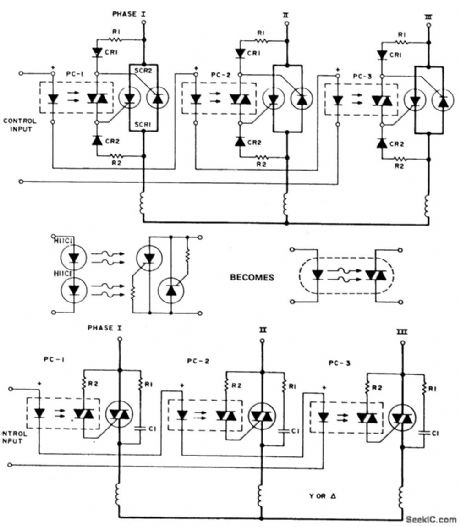
The following are three-phase switches for low voltage. Higher currents can be ob-tained by using inverse parallel SCRs which would be triggered as shown. To simplify the following schematics and facilitate easy understanding of the principles involved, the following schematic substitution is used (Note the triac driver is of limited use at 3 φ voltage levels). (View)
View full Circuit Diagram | Comments | Reading(563)
VARIABLE_GAIN_AND_SIGN_OP_AMP_CIRCUIT
Published:2009/7/5 22:15:00 Author:May


The gain of the amplifier is smoothly controllable between the limits of +1 to -1.It is adjustable over this range using a single potentiometer. The voltage gain of the arrangement is given by:
Where ct represents the fractional rotation of the potentiometer. (View)
View full Circuit Diagram | Comments | Reading(657)
1_9_kHz_PLL
Published:2009/7/5 22:15:00 Author:May
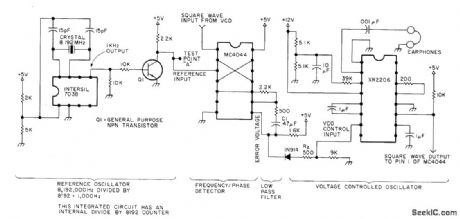
Simple experimental phase locked loop circuit synthesizesfrequencies in audio range, for easy monitoring with headphones.Article gives theory of operation and setup procedure.-.G.R.Allen ,Synthesize Yourself,73Magazine,Oct.1977,p 182-188. (View)
View full Circuit Diagram | Comments | Reading(1962)
25_Hz_SINE_WAVE
Published:2009/7/5 22:14:00 Author:May

Output voltage is 8 V P-P at about 25 Hz for values shown, with total harmonic distortion less than 0.5%. Circuit will operate from 15 Hz to 100 kHz by using other values. Set regeneration control Rl, at minimum value needed to sustain oscillation.-J. C. Freebom, Simple Sinewave Oscillator, EDN/EEE Magazine, Sept. 1, 1971, p44. (View)
View full Circuit Diagram | Comments | Reading(770)
AUTORANGING_FOR_DATA_ACQUISITION
Published:2009/7/5 22:14:00 Author:May
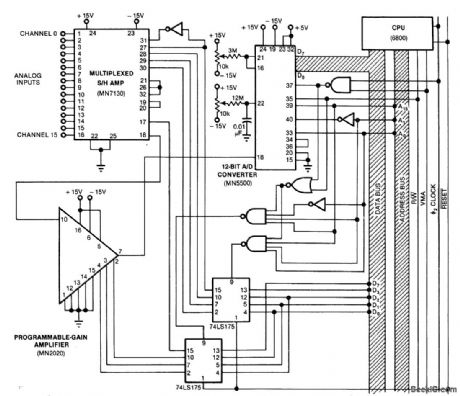
Circuit accepts up to 16 channels of analog information and provides full-scale input ranges from ± 78 mV to ± 10 V when used with 6800 CPU. Resolution is 0.01%. MN7130 multiplexed sample-and-hold amplifier includes eight full differential multiplexers for 16 channels and instrumentation opamp. MN2020 programmablegain amplifier provides choice of eight gains ranging from 1 to 128 in binary progression. Autoranging operation of data acquisition system allows channel-sampling plans that depend on random events. With known input signallevels, required gain information can be stored in microprocessor memory for use in place of autoranging,-R. Duris and J. Munn, PGA's Give Your DAS Designs Autoranging, Wide Dynamic Range, EDN Magazine, Sept. 5, 1978, p 137-141. (View)
View full Circuit Diagram | Comments | Reading(595)
PASSIVE_BRIDGED,DIFFERENTIATOR_TUNABLE_NOTCH_FILTER
Published:2009/7/5 22:14:00 Author:May
View full Circuit Diagram | Comments | Reading(1135)
TUNABLE_AUDIO_FILTER
Published:2009/7/5 22:13:00 Author:May

This filter covers the upper part of the audio passband and can be used to eliminate unwanted high frequencies from audio signals. (View)
View full Circuit Diagram | Comments | Reading(1841)
WIEN_BRIDGE_NOTCH_FILTER
Published:2009/7/5 22:12:00 Author:May
View full Circuit Diagram | Comments | Reading(856)
Distant range remote control coding and decoding transmitting and receiving component circuits
Published:2011/7/26 2:28:00 Author:Christina | Keyword: Distant range, remote control, coding, decoding, transmitting, receiving
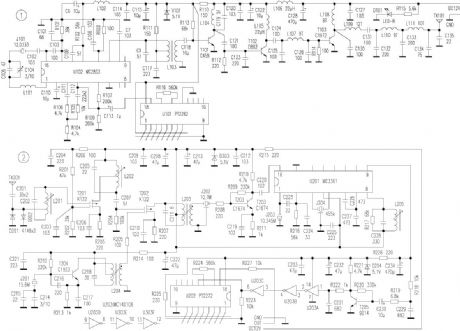
The transmitter components circuit principle
The main technical parameters of the transmitter components are: frequency modulation system; the operating frequency is 36.1MHz; the power voltage is 12V, the transmitter current is less than or equal to 1.5A.
The transmitter components are composed of the coding signal generator circuit, modulated signal amplifier circuit, the transmitter LO circuit, the 3 times frequency amplifier circuit, the high frequency amplifier circuit, the high frequency power amplifier circuit, the coded signal generating circuit uses the special coding circuit U101(PT2262), the modulated signal amplifier circuit, the transmitter local oscillator circuit and the pulse (square wave) modulation circuit use the U102(MC2833). The modulated high-frequency signal is output by the pin of U102.
(View)
View full Circuit Diagram | Comments | Reading(1947)
ACTIVE_BAND_REJECT_FILTER
Published:2009/7/5 22:12:00 Author:May

A filter with a band-reject characteristic is frequently referred to as a notch filter.A typical circuit using a μA741 is the unity-gain configuration for this type of active filter shown. The filter response curve shown is a second-order band-reject filter with a notch frequency of 3 kHz. The resulting Q of this filter is about 23, with a notch depth of -31 dB. Although three passive T networks are used in this application, the operational amplifier has become a sharply tuned low-frequency filter without the use of inductors or large-value capacitors. (View)
View full Circuit Diagram | Comments | Reading(4652)
WIEN_BRIDGE_AF_RF
Published:2009/7/5 22:11:00 Author:May
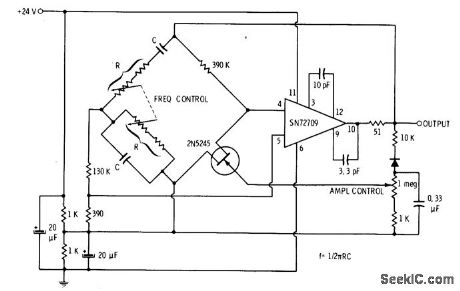
Single JFET in basic Wien-bridge circuit drives Texas Instruments linear opamp serving as output stage. Feedback path from output of ICto base of JFET stabilizes output and provides temperature compensation. Dual pot in bridge circuit serves for frequency control, Circuit performs well as either AF or RF oscillatordepending on values used for R and C.-E. M. Noll, FET Prinqiples, Experiments, and Projects, Howard W. Sams, Indianapolis, IN, 2nd Ed., 1975, p 213-214. (View)
View full Circuit Diagram | Comments | Reading(500)
TUNABLE_NOTCH_FILTER_USES_AN_OPERATIONAL_AMPLIFIER
Published:2009/7/5 22:11:00 Author:May

This notch filter is useful for tunable band-reject applications in the audio range. The values shown will give a tuning range of about 300-1500 Hz. (View)
View full Circuit Diagram | Comments | Reading(719)
AUDIO_NOTCH_FILTER
Published:2009/7/5 22:10:00 Author:May


With the circuit shown here the response at one octave off tune is within 10% of the far out response: notch sharpness may be increased or reduced by reducing or increasing respectively the 68 K ohm resistor. Linearity tracking of R8 and R9 has no effect on notch depth. The signals at HP and LP are always in antiphase, notch will always be very deep at the tuned frequency, despite tolerance variations in R6-9 and C2, C3. (View)
View full Circuit Diagram | Comments | Reading(1025)
TUNABLE_AUDIO_NOTCH_FILTER_CIRCUIT
Published:2009/7/5 22:09:00 Author:May

The circuit requires only one dual-ganged potentiometer to tune over a wide range ; if necessary over the entire audio range in one sweep. The principle used is that of the Wien bridge, fed from anti-phase inputs. The output should be buffered as shown with a FET input op amp, particularly if a high value pot is used. An op amp with differential outputs (eg., MC1445) may be used in place of the driver ICS; R2 may be made trimmable to optimize the notch. (View)
View full Circuit Diagram | Comments | Reading(2179)
ANALOG_DIGITAL_CONVERSION
Published:2009/7/5 22:09:00 Author:May

Circuit canbe used for either ramp orsuccessive-approximation method of converting analog input to digital word, applying it to DAC, and comparing analog output of DAC to analog input to be converted. Results of comparison determine next digital word to be generated for DAC by microprocessor. LM301A changes 0-2 mA output of DAC into 0-5 V for LM311 comparator. To calibrate, apply all 0s to DAC; pin 6 of LM301A should now be near 0V Apply all 1s to DAC and adjust output of LM301A to 5.00 V with R4,Conversion routines implementing these functions are given for Motorola MC6800 and Intel 8008 microprocessors.-R, Frank, Microprocessor Based Analog/Digital Conversion.BYTE, May 1976.p70-73. (View)
View full Circuit Diagram | Comments | Reading(1774)
550_Hz_NOTCH_FILTER
Published:2009/7/5 22:08:00 Author:May

The circuit produces at least 60 dB of attenuation。f the notch frequency. (View)
View full Circuit Diagram | Comments | Reading(889)
DOT_GENERATOR
Published:2009/7/5 22:07:00 Author:May

Can be used by amateur radio operator to talk himself onto frequency while Iistening on downlink passband of Oscar satellite, without causing interference to other stations using satellite. Generates audio dots at rate of 12 per second. Frequency of free-running MVBR Q1-Q2 is determined by values of C1, C2, R1, and R2. Emitter-follower Q3 drives 1500-Hz audio oscillator Q4. C1 and C2 are 1-μF 16-V electrolytics. Q1-Q4 are 2N2222 or equivalent NPN general-purpose transistors.-M. Righini and G. Emiliani. Audio Dot Generator Eases OSCAR SSB Spotting, QST, Nov. 1977. p 45. (View)
View full Circuit Diagram | Comments | Reading(577)
1800_Hz_NOTCH_FILTER
Published:2009/7/5 22:07:00 Author:May

The circuit produces at least 60 dB of attenuation of the notch frequency. (View)
View full Circuit Diagram | Comments | Reading(713)
ADJUSTABLE_Q_NOTCH_FILTER
Published:2009/7/5 22:07:00 Author:May

In applications where the rejected signal might deviate slightly from the null on the notch network, it is advantageous to lower the Q of the network. This insures some rejection over a wider range of input frequencies. The figure shows a circuit where the Q may be varied from 0.3 to 50. A fraction of the output is fed back to R3 and C3 by a second voltage follower, and the notch Q is dependent on the amount of signal fed back. A second follower is necessary to drive the twin T from a low-resistance source so that the notch frequency and depth will not change with the potentiometer setting. (View)
View full Circuit Diagram | Comments | Reading(0)
QTT533 Reset Function Voltage Regulated Integrated Circuit
Published:2011/7/29 9:36:00 Author:Michel | Keyword: Reset Function, Voltage Regulated, Integrated Circuit

First,Functions Features
QTT533 integrated circuit contains reset circuit, + 5 V power supply voltage stabilizer and so on.
Second,Pins Functions and Data
QTT533 integrated circuit uses pin single in-line package and its pins functions and data are shown as table 1.
Tip: When QTT533 integrated circuit is damaged and it can be subsituted by 78LRO5 directly.
Table 1:QTT533 IC Pins Functions and Data (View)
View full Circuit Diagram | Comments | Reading(697)
| Pages:1083/2234 At 2010811082108310841085108610871088108910901091109210931094109510961097109810991100Under 20 |
Circuit Categories
power supply circuit
Amplifier Circuit
Basic Circuit
LED and Light Circuit
Sensor Circuit
Signal Processing
Electrical Equipment Circuit
Control Circuit
Remote Control Circuit
A/D-D/A Converter Circuit
Audio Circuit
Measuring and Test Circuit
Communication Circuit
Computer-Related Circuit
555 Circuit
Automotive Circuit
Repairing Circuit

